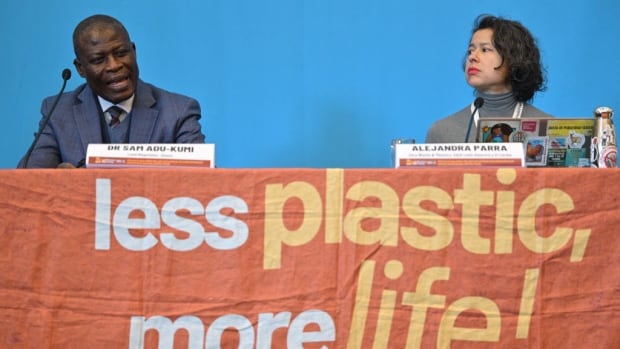Negotiators working on a treaty to address the global crisis of plastic pollution for a week in South Korea won’t reach an agreement and plan to resume the talks next year.
They are at an impasse over whether the treaty should reduce the total plastic on Earth and put global, legally binding controls on toxic chemicals used to make plastics.
The UN Intergovernmental Negotiating Committee meeting in Busan, South Korea, was supposed to be the fifth and final round of negotiations, to produce the first legally binding treaty on plastics pollution, including in the oceans, by the end of 2024. But with time running out early Monday, negotiators plan to resume the talks next year.
More than 100 countries want the treaty to limit production as well as tackle cleanup and recycling, and many have said that is essential to address chemicals of concern. But for some plastic-producing and oil and gas countries, that crosses a red line.
For any proposal to make it into the treaty, every nation must agree to it. Some countries sought to change the process so decisions could be made with a vote if consensus couldn’t be reached and the process was paralyzed. India, Saudi Arabia, Iran, Kuwait and others opposed changing it, arguing consensus is vital to an inclusive, effective treaty.
On Sunday, the last scheduled day of talks, the treaty draft still had multiple options for several key sections. Some delegates and environmental organizations said it had become too watered-down, including negotiators from Africa who said they would rather leave Busan without a treaty than with a weak one.
Canadian Environment Minister Steven Guilbeault says he’s disappointed that no agreement was reached on Sunday, but he added he is still hopeful a deal can be struck as negotiators make plans to meet again next year.
Guilbeault says he would plan to use next year’s G7 summit set be hosted in Alberta as a platform to advance the issue.
Production expected to sharply increase
Every year, the world produces more than 360 million tonnes of new plastic. Plastic production could climb about 70 per cent by 2040 without policy changes.
Plastic production is on track to triple by 2050, and microplastics have been found in air, fresh produce and even human breast milk.
In animals such as fish, these broken-down bits of larger plastics have been linked to lower levels of growth and reproduction, among a host of other issues. Researchers are still trying to determine more conclusively whether microplastics carry a direct risk to human health, and at what level.
In Ghana, communities, bodies of water, drains and farmlands are choked with plastics, and dumping sites full of plastics are always on fire, said Sam Adu-Kumi, the country’s lead negotiator.
“We want a treaty that will be able to solve it,” he said in an interview. “Otherwise we will go without it and come and fight another time.”

At Sunday night’s meeting, Luis Vayas Valdivieso, the committee chair from Ecuador, said that while they made progress in Busan, their work is far from complete and they must be pragmatic. He said countries were the furthest apart on proposals about problematic plastics and chemicals of concern, plastic production and financing the treaty, as well as the treaty principles.
Valdivieso said the meeting should be suspended and resume at a later date. Many countries then reflected on what they must see in the treaty moving forward.
Thousands of delegates are in Ottawa trying to hammer out an historic treaty to end plastic pollution, but the road to get there is littered with hurdles. CBC’s Susan Ormiston examines why it’s so hard to curb the problem and what it will take for the world to agree on a plan.
Rwanda’s lead negotiator, Juliet Kabera, said she spoke on behalf of 85 countries in insisting that the treaty be ambitious throughout, fit for purpose and not built to fail, for the benefit of current and future generations. She asked everyone who supported the statement to “stand up for ambition.” Country delegates and many in the audience stood, clapping.
Panama’s delegation, which led an effort to include plastic production in the treaty, said they would return stronger, louder and more determined.
Saudi Arabia’s negotiator said chemicals and plastic production are not within the scope of the treaty. Speaking on behalf of the Arab group, he said if the world addresses plastic pollution, there should be no problem producing plastic. Kuwait’s negotiator echoed that, saying the objective is to end plastic pollution, not plastic itself, and stretching the mandate beyond its original intent erodes trust and goodwill.
In March 2022, 175 nations agreed to make the first legally binding treaty on plastics pollution, including in the oceans, by the end of 2024. The resolution states that nations will develop an international legally binding instrument on plastic pollution based on a comprehensive approach that addresses the full life cycle of plastic.
Stewart Harris, a spokesperson for the International Council of Chemical Associations, said it was an incredibly ambitious timeline. He said the ICCA is hopeful governments can reach an agreement with just a little more time.
Most of the negotiations in Busan took place behind closed doors. Environmental groups, Indigenous leaders and others who travelled to Busan to help shape the treaty said it should’ve been transparent and they felt silenced.
“The voices of the impacted communities, science and health leaders are silent in the process, and to a large degree, this is why the negotiation process is failing,” said Bjorn Beeler, international co-ordinator for the International Pollutants Elimination Network. “Busan proved that the process is broken and just hobbling along.”
South Korea’s Foreign Affairs Minister Cho Tae-yul said that though they didn’t get a treaty in Busan as many had hoped, their efforts brought the world closer to a unified solution to ending global plastic pollution.



